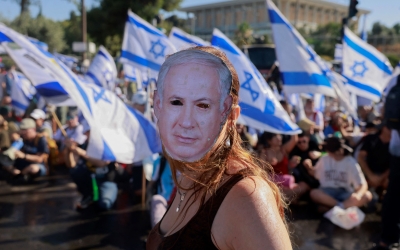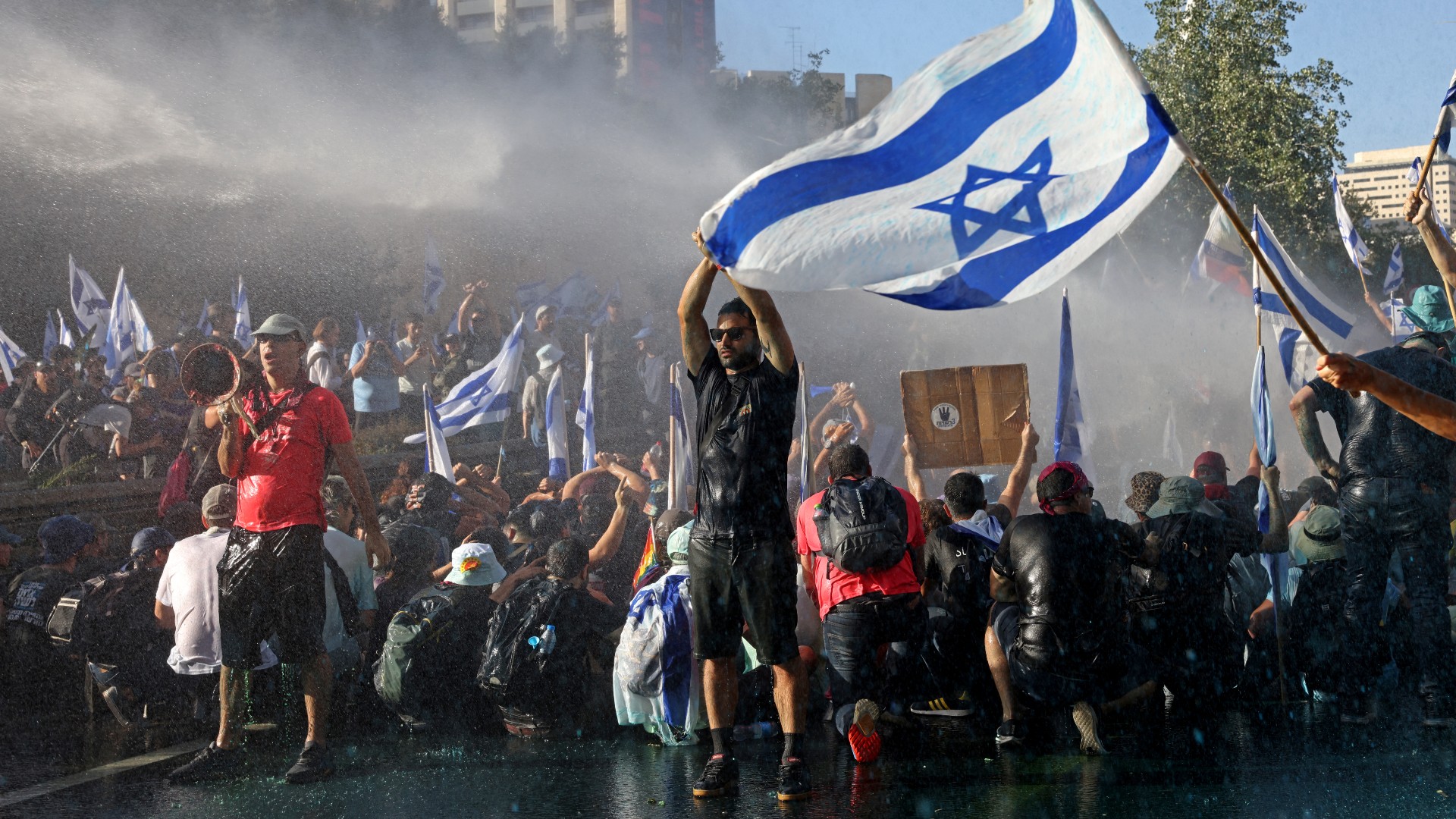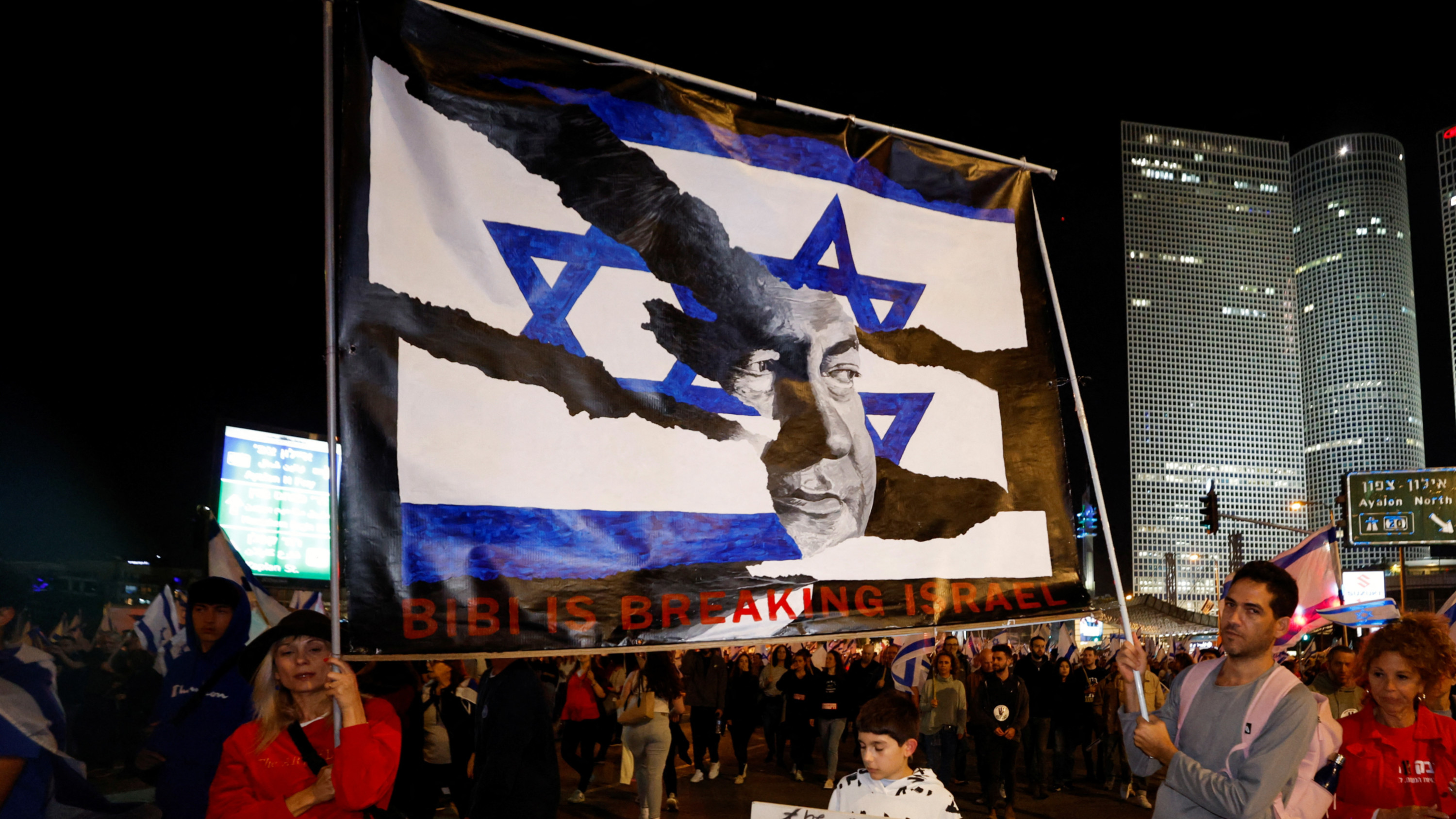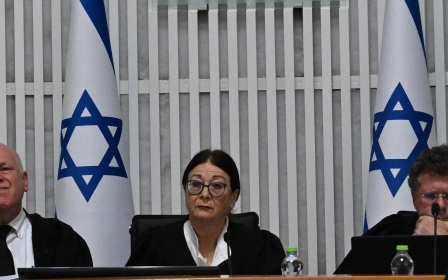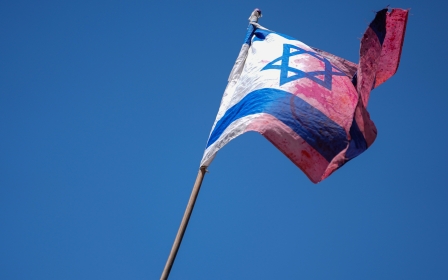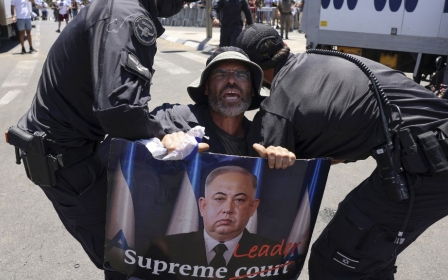Analysis: Why Israel's judicial crisis is part of a battle over its founding symbols
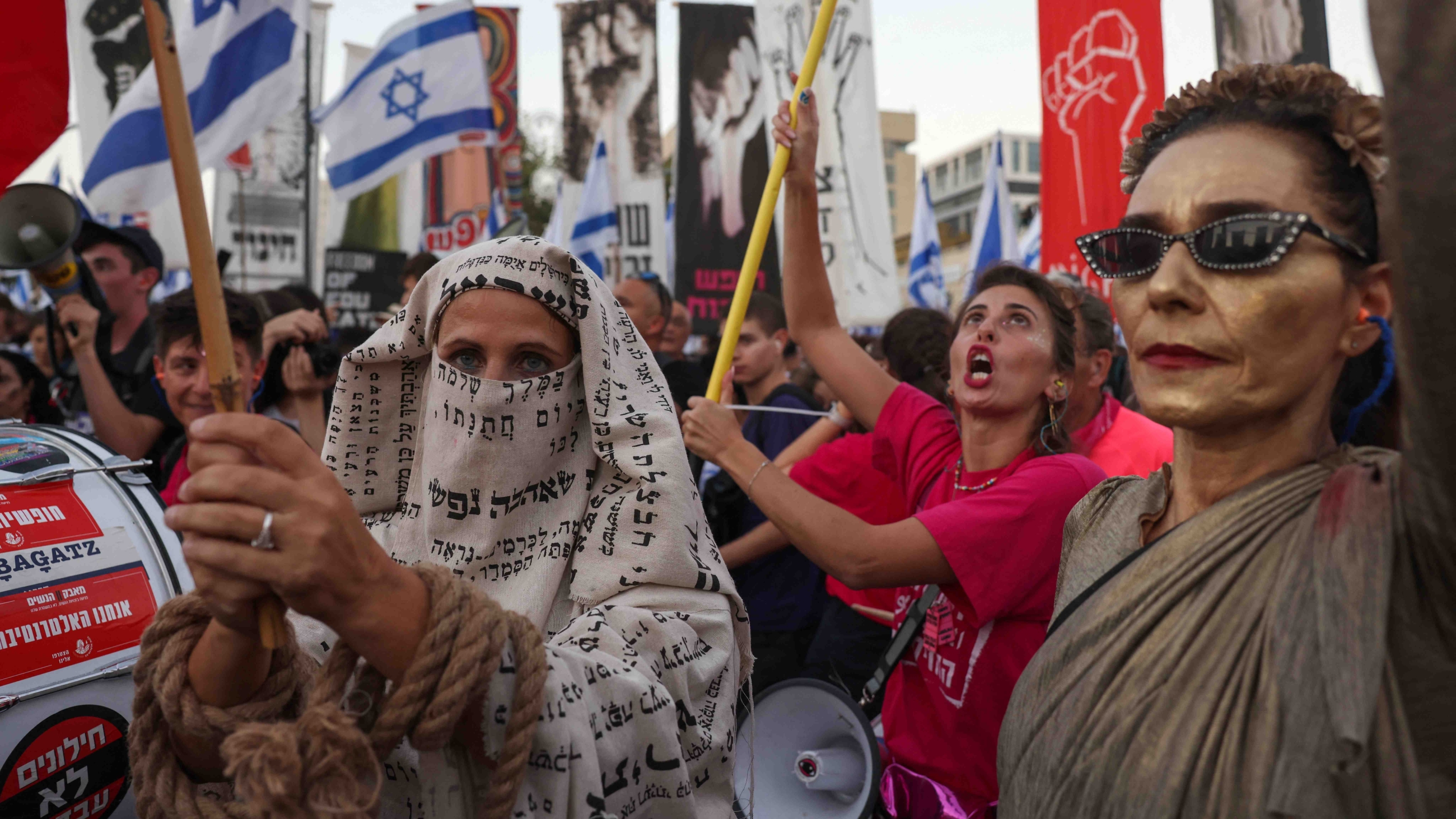
Israel’s recent judicial overhaul, or coup to its critics, has finally provided proof of what many in the country have long sensed. That is, the current Israeli government’s end game goes way beyond changing the judicial system and is even more than regime change. It is the destruction of “old Israel” and the establishment of a new, openly religious apartheid state that has a different set of values, at the core of which is the annexation of the occupied Palestinian territories.
It is a vision, ironically, best captured in the lyrics of the Marxist anthem The Internationale, which goes, “We'll change henceforth the old tradition. And spurn the dust to win the prize.”
In order to get to this prize, control of the judicial system and media is not enough. The key aim is to take control of the state’s founding ethos.
And according to opponents of Netanyahu, this is exactly what his government is working on now.
This intent to change “old tradition” and “rise on new foundations” was at its most perceivable when all 15 of Israel’s Supreme Court justices gathered to hear a petition aimed at overturning a controversial law passed by Netanyahu’s coalition government in July, which revoked the “reasonableness standard”.
New MEE newsletter: Jerusalem Dispatch
Sign up to get the latest insights and analysis on Israel-Palestine, alongside Turkey Unpacked and other MEE newsletters
The clause has been used for decades by the Supreme Court as a tool to control unreasonable government decisions and appointments.
After the attorney general refused to defend the new controversial law, the government hired a private attorney, Ilan Bombach, to represent it.
The guarantee of equality
Bombach took those watching the proceedings by surprise when he chose to spurn the Israeli Declaration of Independence as a “hasty document sanctified by 37 unelected signatories and one that the High Court could not rely on as a source of legal authority”.
Indeed, the declaration is neither a statutory document nor a legal text, but in the absence of a constitution it is considered a founding document in Israel. It is the only document that refers to the democratic nature of the state and, at least in theory, promises full social and political equality to Israeli citizens, without distinguishing between race, creed or sex.
In practice, of course, it is a very different story. The 2018 Jewish Nation State law, to name an example, proves that the declaration's promise remains unfulfilled.
Nevertheless, the declaration remained a frame of reference - and it is now in the Netanyahu government’s firing line.
The arguments put forward by the government’s main advocate at the court are curious, to say the least. Bombach argued that it would be ridiculous to think the declaration could be binding for future generations, citing the absence of Palestinians and the lack of women among its signatories.
That would be a valid argument if it was not coming from a representative of a Jewish supremacist coalition, which features no Palestinians and has a significant dearth of women. Bombach refused to say whether this particular opinion represented the views of the government.
Still, by undermining the declaration, the most radical right-wing, fascistic and nationalist government turns out to be the least Zionist one - unless, of course, Zionism is defined exclusively in terms of expanding settlements in the occupied territories and moving towards their de facto annexation.
A war over symbols
This schism within the Israeli political establishment has its parallel within society itself, with opponents of the judicial overhaul taking to the streets continuously since the idea was first floated at the start of 2023.
However, beyond political action and protests, there is an ongoing ideological war over the symbols of Israel’s foundation.
Last week, on the eve of the Jewish new year, an arsonist set fire to a statue of David Ben-Gurion, Israel’s first prime minister and the man considered the primary founder of the state of Israel.
The tongue-in-cheek depiction of Ben-Gurion, of him balancing on his head at a Tel Aviv beach, was based on one of his actual practices.
There are not many incidents of statues being vandalised in Israel, as there aren’t many statues. But the incident was one of many new “firsts” in Israeli society.
Hours after the arson, police arrested a homeless man suffering from mental health issues, on suspicion of setting fire to the statue.
The symbolism of the act is not lost, irrespective of motivation. It just happened to be the case that the man chose to attack a depiction of Ben-Gurion - the person who announced the establishment of the State of Israel by reading aloud the Declaration of Independence - at a time when the declaration is under attack by the ruling government.
Add to this the recent government decision to freeze funding for a museum where the original declaration was supposed to be presented to the public for the first time, and Agatha Christie’s old adage comes to mind: “It’s too much of a coincidence to be a coincidence.”
Both Ben-Gurion and the Declaration of Independence are considered by Zionist Israelis and Zionist Jews all over the world as founding symbols. Therefore, in the eyes of the government and its supporters, they have to go.
This is contrasted by the months-old protest movement against the judicial overhaul, which has rallied around the symbols of Ben-Gurion and the Declaration of Independence.
At the entrance to a protest site in Tel Aviv, demonstrators project the text of the declaration onto the wall of a building. The voice of Ben-Gurion reading aloud the declaration emanates from speakers, and groups of attendees wear T-shirts saying “loyal to the Declaration of Independence”.
In the dark hours during the weekly protests, the site takes on a biblical look and feel, and the declaration amid this scene is elevated to the status of a holy scripture.
Bombach's statement on the declaration therefore serves as a retaliatory move against its use by the protesters, mirroring how the judicial overhaul appears to be driven more by a sense of ideological vendetta than a strictly legal endeavour.
Settlements and annexation
In the wake of Bombach's declaration speech, a mass protest commenced at Rothschild 16, a site famously known as "Independence Hall" for its historical significance as the place where Israel's Declaration of Independence was made in 1948.
While this day of the declaration is celebrated as Israel's birth, it is simultaneously remembered by Palestinians as the Nakba.
This historical backdrop sheds light on why many Palestinians may be hesitant to participate in a protest that originates from this location - a consideration Israel’s protest movement must take into account when it asks why Palestinian citizens were absent.
Bombach was right in insinuating the Declaration of Independence is not sacred; it just feels wrong coming from a man and a camp for whom only land is sacred, and worth killing and dying for.
Palestinian life is certainly not sacred and of no value to the coalition. The first demand its 14 members made just a day after the Supreme Court gathering was to ease the prison conditions of Jewish terrorist Amiram Ben Uliel, who in 2015 killed the Palestinian Dawabsheh family at their home in the village of Duma in the occupied West Bank.
“It’s really self-evident and the process is clear,” Yair Golan, former Israeli army deputy chief of staff and retired major general, tells Middle East Eye.
“The journey to eliminate the past is on its way… the Declaration of Independence is just the beginning," adds Golan, who is now a politician for the Meretz party. "Later on, they will write a new national narrative to replace the old one, based on messianic nationalism.”
'The Declaration of Independence belongs to an Israel that has to be abolished. It cannot remain a founding document for Netanyahu and his people'
- Yair Golan, former deputy military chief
“The Declaration of Independence belongs to an Israel that has to be abolished. It cannot remain a founding document for Netanyahu and his people. I know them; I’ve worked with them for years. The founding ethos of religious Zionism is settling in the territories occupied in 1967 and then annexation.
“They cannot carry out this plan in a democratic state - so the first step has to be engineering the mind and breaking up the old symbols of democracy. There is more to come, accompanied by severe political violence.”
Golan previously made international headlines when, in the 2016 Holocaust Remembrance Day ceremony, he compared “revolting signs” found in Israel to Nazi-era Germany in the 1930s.
The signs will keep accumulating while the state waits for the ruling of the Supreme Court.
Uncharted waters
Whatever the court decides, it can already be defined as “historic”, as it will define the constitutional character of the state.
While Israel does not have a constitution, it has Basic Laws, which form the core of its legal system. As July’s move to revoke the reasonableness standard was passed as a Basic Law, a decision to revoke the law would be a first in Israel’s history and would pave the way for a constitutional crisis.
Minister of Justice Yariv Levin, the main architect of the judicial overhaul, said that even deciding to hold the hearing on 12 September was a “fatal blow” to democracy, because it represented the first time the court was considering striking down a "Basic Law”.
Some members of the coalition have already hinted the government could ignore the court's decision. The Speaker of the Knesset, MK Amir Ohana, said so openly, claiming that the rule of law is represented by parliament and not by the court.
As an alternative, members of the coalition discussed the option of setting up a new “constitutional court”, which would bypass the High Court of Justice.
The ruling on this divisive judicial reform may take weeks or even months, and any attempt to predict the outcome is guesswork based on the “profiling” of the 15 justices.
Of the 15, eight are considered liberal, four are conservatives and three, relatively new members, have not yet been placed on the spectrum.
Strangely enough, contrary to their portrayal by the coalition as a hostile oligarchy, all of the justices were chosen by a Judicial Selection committee under Netanyahu.
On the face of it, there is a majority of justices ready to make history by striking down a Basic Law. But Supreme Court President Esther Hayut is set to retire in mid-October, and many wonder if that’s the legacy she wants to leave behind.
Essentially, though, it is not about reasonableness standards; it is a ruling on democracy or the lack of it.
As Justice Yitzhak Amit said in the 13 hour-long first hearing: “Democracy doesn’t die from a few strong blows; rather, it dies in a series of small steps.”
This article is available in French on Middle East Eye French edition.
Middle East Eye delivers independent and unrivalled coverage and analysis of the Middle East, North Africa and beyond. To learn more about republishing this content and the associated fees, please fill out this form. More about MEE can be found here.


